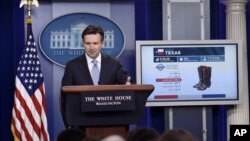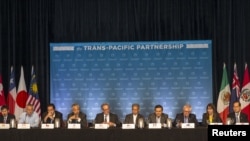Even before the text of a massive Pacific Rim free trade accord is made public, U.S. lawmakers of both political parties are voicing skepticism about the Trans-Pacific Partnership’s chances of being approved by Congress next year.
“Very tough,” Republican Senator Chuck Grassley of Iowa told VOA. "Doesn’t mean it can’t be done, but it is going to be a tough lift.”
“Next year is an election year, and in an election year it’s hard to do anything of major consequence,” said Democratic Senator Maria Cantwell of Washington State.
Negotiated between the United States and 11 other nations that when combined account for about 40 percent of global economic output, the TPP would create the world’s biggest free trade bloc and serve as President Barack Obama’s crowning achievement in international commerce.
But while swift approval is expected in Vietnam and elsewhere in Asia, its fate is anything but certain in the United States.
'Fast track' authority
Earlier this year, Congress passed so-called “fast track” authority that subjects trade pacts to simple-majority votes in both chambers with no amendments allowed. But even with legislative hurdles greatly reduced, it is not clear that majorities will materialize to approve the TPP.
Republican Senator Lindsey Graham of South Carolina said forces at opposite ends of America’s ideological spectrum could unite to defeat the pact.
“The unions are always against trade agreements, and you have the Tea Party [Republican] types who have an isolationist view. Those things create a pretty good voting bloc [opposing TPP],” said Graham.
For now, many lawmakers are reserving judgment until they read the text of the deal, which was announced in early October, but has yet to be released.
“The law requires that it be on the Internet for 90 days for the public to read before we can vote on it,” said Grassley. “So I hope my constituents will read it and tell me their opinion.”
“Obviously, it is going to depend on the text, what’s in there,” Democratic Senator Ben Cardin of Maryland told VOA. “There’s a natural response by organized labor against [TPP] and a natural response of the business community in support. But I think most Marylanders are waiting to see the text.”
“Everybody here who supports opening up markets for U.S. products wants to understand what Asian markets are willing to do to allow American products in,” said Cantwell. "We are very anxious to see the details.”
Line-by-line details
Even as lawmakers await line-by-line details of the accord, some are decrying provisions already reported, such as an eight-year limit on exclusive rights to biologic pharmaceutical products developed in the United States.
Others object to a provision that would make it harder for U.S. tobacco companies to contest the treatment of their products abroad.
“The Obama administration is rigging the system to pick winners and losers in favor of industries that he and his allies support,” said Republican Senator Richard Burr of North Carolina, a major tobacco-growing state, in a statement. “I cannot support a deal that singles out North Carolina’s agricultural industry unfairly.”
Other lawmakers see benefits for their constituents.
“Overall, for Iowa, we export a lot of our agricultural goods, so it would be a good thing for Iowa,” said Republican Senator Joni Ernst.
But even Ernst is not committing to a firm “yes” vote just yet.
“We haven’t been able to read those documents, and it will be very important that we do that,” she said.






